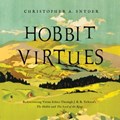A response to our fractured political discourse, Hobbit Virtues speaks to the importance of “virtue ethics” by examining the fiction of J. R. R. Tolkien—with particular attention to his hobbits.
Tolkien’s works resonate with so many readers in part because Bilbo, Frodo, Sam, Merry, and Pippin demonstrate Classical, Judeo-Christian, Medieval, and even Hindu and Confucian virtues. Tolkien ennobles the small, the humble, and the marginalized in his Middle-earth writings and presents leaders who are hesitant to exercise power, are courteous, and value wisdom and learning. Each chapter in Hobbit Virtues consists of a wide-ranging discussion of a single virtue, exemplified by a character in Middle-earth, explaining its philosophical or theological roots and how the virtue is still relevant in a modern democracy. It will also include appendices where readers can find passages in Tolkien’s and Lewis’s works that discuss virtue ethics, and a glossary of virtues from ancient to modern, East to West. Tolkien’s readers come from many different religious and secular backgrounds and the pleasure and profundity of Hobbit Virtues is that mutual respect for public virtues is, especially now, necessary for a well-functioning pluralistic society.

